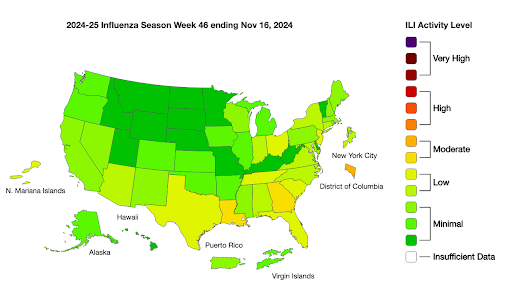How long do flu shots last?
In general, you can count on 6 months of meaningful protection starting two weeks after you get your annual flu vaccine. Protection may wane earlier in older adults.
Those Nerdy Girls: Standing Strong for Science
Needed now more than ever.
This Giving Tuesday, we invite you to stand strong for science with Those Nerdy Girls! Your support helps us continue delivering trusted, evidence-based health information to communities worldwide. Every contribution makes a difference—join us in building a healthier, more informed future. 🧡
How long do flu shots last?
In general, you can count on 6 months of meaningful protection starting two weeks after you get your annual flu vaccine. Protection may wane earlier in older adults.
Flu activity is just picking up now… it’s still a GREAT time to get your flu shot!
Getting vaccinated in advance of flu season’s start ensures that you have good coverage when the season begins, and in most adults, your protection will stick around for at least 6 months. September to October are considered ideal, but it’s not too late! Flu season is starting to pick up, so if you haven’t gotten your flu vaccine yet, you can still benefit. In fact, some might say now is the perfect timing.
📆 Two weeks from vaccination to full protection.
Following an annual flu vaccination, it takes about two weeks for your body to build up protection against influenza. This is why getting vaccinated before flu season is underway is recommended. In the Northern Hemisphere, flu season usually starts in November, so the current recommendation is to be vaccinated in September-October.
📆 Is it too late?
“The best time to plant a tree is 30 years ago. The second-best time is now.”
You can still benefit from a flu vaccine all the way up until the end of the season. That’s true even if you get the flu. This year’s vaccines cover three strains of flu, so vaccination offers coverage for strains you did not get.
📆 Peak protection for 3-4 months.
After that initial two-week period, protection from influenza remains quite high for 3-4 months in most people. A recent study looked at 2016 through 2019 influenza cases. They measured the relationship between days since vaccination and protection from the flu. Protection wanes at a rate of 7-9% per month for all adults. It wanes more quickly for people over age 65. The range for that age group is 10-11% waning per month.
📆 Still some protection at 6-8 months.
Studies of vaccine effectiveness over time do show that there is still some meaningful benefit of vaccination at 6-8 months.
However, protection does not carry over well from year to year. This is partly because the vaccine “wears off.” The other factor at play is that the flu virus mutates easily, and last year’s vaccine doesn’t always cover this year’s flu strains well in the first place.
Recent changes in flu vaccine recommendations are trying to cover older adults better, and for longer.
Starting in 2022, the CDC recommended a higher dose or adjuvanted flu vaccines for older adults when they are available. Studies suggest that in older adults, these vaccines produce a stronger immune response and could be more effective or wane more slowly within the season. However, the real-world data are not in--we don’t really know if these targeted formulations make a difference yet.
Many clinicians recommend that older adults wait until late October to get their flu vaccine. In a typical year, flu season begins in November, peaks around December-January, and goes through March-April. Waiting until the end of the recommended timing window (hopefully) means an older adult has good protection in place when flu season is at its worst. Unfortunately, flu season can be unpredictable! It’s hard to know when it will peak.
So, in general, flu vaccine protection peaks at two weeks following vaccination and lasts–to a meaningful extent–for around 5-6 months. Protection wanes somewhat faster in older adults. The specifics of how long your flu vaccine will protect you depends on what strains are circulating, how well-covered they are by the vaccination this year, and your age.
In any case, the 2024-2025 flu season is picking up, so if you haven’t gotten a flu vaccine yet, now’s a great time!
Source: https://www.cdc.gov/fluview/surveillance/2024-week-46.html
Stay safe, stay well.
Those Nerdy Girls
**This post was updated from the original written by Dr. Malia Jones on 11/12/23.
ICYMI - Digest of Recent Posts:
General Health: Public Health Thank You Day was celebrated on 11/25!
Vaccines: Do flu vaccines work?
Help Advance Science & Get Free At-Home COVID, Flu, and RSV Testing!
The City University of New York Institute for Implementation Science in Population Health (CUNY ISPH) is recruiting participants for an ongoing research study on respiratory infections. To learn more, watch a short video about the study.
If you or someone you know is interested in participating, simply email the study team at recruitprotects@sph.cuny.edu for a personalized link to the study recruitment form. Please put “Interested in CUNY Project PROTECTS - TNG” in the Subject line.
Reminder that we now have an online store filled with amazing nerdy merchandise.
Your purchases will help financially support the science communication mission of Those Nerdy Girls.
P.S. We’d love to see pics of you and your friends and family sporting their new TNG swag. You might even be featured in our shop! Email us your pics at info@dearpandemic.org
Like what you read? Please share it with others!
If you have a question, let us know!
We read every question and use them to inform our upcoming content, though we are unable to respond to each specific question.




